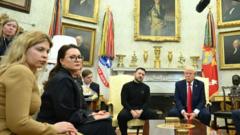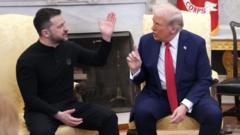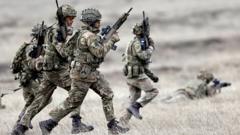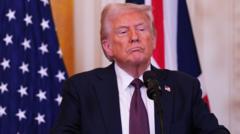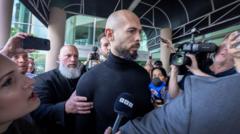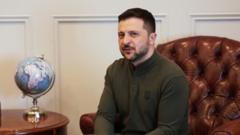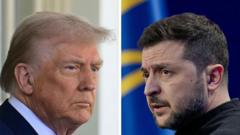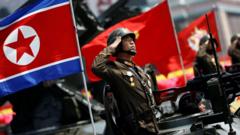In a recent NATO meeting, U.S. Defense Secretary Pete Hegseth defended President Trump’s call with Putin concerning Ukraine, asserting it posed no betrayal despite Ukrainian absence, while European leaders urge for Ukrainian inclusion in negotiations.**
Conflicting Views on U.S.-Russia Negotiations Amid Ukrainian Crisis**

Conflicting Views on U.S.-Russia Negotiations Amid Ukrainian Crisis**
Defense Secretary Hegseth reassures NATO following Trump-Putin conversation, emphasizing the need for Ukrainian involvement.**
The ongoing war in Ukraine has taken a complicated turn following President Trump’s recent phone call with Russian President Vladimir Putin, which sparked debate among European allies. Defense Secretary Pete Hegseth defended the dialogue during a NATO meeting in Brussels, asserting it underpinned a push for peace rather than undermining Ukrainian interests, even though Ukraine was not represented in this crucial discussion.
"This is not a betrayal," Hegseth stated firmly. "This call shows a global commitment to peace, which is crucial for all parties involved." Trump's conversation with Putin marked the first engagement between the two leaders since Trump resumed his presidency, leading to fears in Europe that Ukraine's voice may be sidelined in future peace talks.
European leaders, including NATO Secretary General Mark Rutte, have staunchly advocated for Ukraine's central role in any negotiations aimed at resolving the conflict, emphasizing the importance of their participation. Rutte underscored that any discussions must involve Ukrainian representatives, drawing attention to the sensitivity of this issue for Kyiv and its allies.
Hegseth's comments followed earlier news where he indicated limited support for Ukraine's NATO aspirations and deemed a return to pre-2014 borders unrealistic. He also called for a notable increase in NATO nations’ military expenditures, suggesting a collective shift toward 5% of GDP in defense spending, and urged European nations to take a firmer stance on security measures.
Despite the potentially controversial dialogue between Trump and Putin, Hegseth reiterated the U.S. commitment to NATO, aiming to calm any nerves in alliance nations following Trump's past suggestions of withdrawing from NATO. “America stands shoulder to shoulder with our allies to ensure that our collective strength helps bring this conflict to an end,” he concluded, aiming to reinforce U.S. support for NATO at a time of heightened tension and uncertainty.

